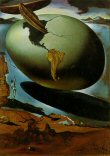Edge asked The Edge Annual Question 2010 to 170 scientists, philosophers, artists and authors. This year question was “How is the Internet Changing the Way You Think“? Interesting question with several intesting answers as well as some which looked like “Oh no, my literary agent wants me to answer another question, let’s just write something down”.
Among the ones who grabbed my attention was Anthony Aguirre’s (Associate Professor of Physics, University of California, Santa Cruz) answer “The Enemy of Insight?” which reverberates with my reflections on knowledge and the inner mechanisms which insights are based on.
A passages from Anthony Aguirre’s answer:
I, like most of my colleagues, spend a lot of time connected to the Internet. It is a central tool in my research life. Yet when I think of what I do that is most valuable — to me at least — it is the occasional generation of genuine creative insights into the world. And looking at some of those insights, I realized that essentially none of them have happened in connection with the Internet…
I’ve come think that it is important to cultivate a ‘don’t know’ mind: one that perceives a real and interesting enigma, and is willing to dwell in that perplexity and confusion. A sense of playful delight in that confusion, and a willingness to make mistakes — many mistakes — while floundering about, is a key part of what makes insight possible for me. And the Internet? The Internet does not like this sort of mind. The Internet wants us to know, and it wants us to know RIGHT NOW: its essential structure is to produce knowing on demand. I don’t just worry that the Internet goads us to trade understanding for information (it surely does), but that it makes us too accustomed to to instant informational gratification. Its bright light deprives us of spending any time in the fertile mystery of the dark.
The attitude of not-knowing is been shared by good science and by spiritual researchers as well, two worlds who usually tend te be considered far apart. Descartes itself is his Discourse on the Method started his philosophical investigation with a not-knowing attitude which made him find his first principle of the philosophy “I think, therefore I am”.
Let’s see what the spiritual teachers say about not-knowing. Sri Aurobindo said, regarding the enlightened mind: “One is in an unutterable state of truth without understanding anything about it – simply, it is.” (Satprem. Sri Aurobindo, or the Adventure of Consciousness. Harper & Row. New York. 1974.)
Nisargadatta Maharaj:
When consciousness mixes with itself, that is samadhi. When one doesn’t know anything – and doesn’t even know that he doesn’t know anything – that is samadhi. (Nisargadatta Maharaj. Prior to Consciousness. Talks with Sri Nisargadatta Maharaj. Acorn Press. Durham. 1985. p. 6)
Then Osho:
This is the the ultimate paradox of mysticism: with not-knowing you can reach knowing and through knowing yiu lose it. Not-knowing is superior to any knowledge. Universities make you learned but when you enter the Buddhafield of a spiritual Master you enter in an anti-university. In the university you harvest more and more knowledge, information and you accumulate. In the anti-university of a Master you unlearn more and more… until the moment you don’t know anything anymore. (Osho. Theologia Mystica. Rebel Publishing House. 1983)
And Almaas:
Why am I here? Where am I going? We need to see how honest we can be with ourselves when trying to answer these questions. These two questions are related; that is, most people think they are here because there is a goal, they want to go somewhere. Where do you want to go? You probably think you know; do you? Do you think I know where you should go? If you think I know, can I tell you? And if I tell you, will you follow? Can you follow? These are questions that you cannot answer with your mind. These are questions that should remain questions. Do not try to simply answer them mentally. These questions are like a flame. If you answer them with your mind, you will put out the flame, because the mind doesn’t, the mind can’t know the answers to these questions. When you answer them with your mind and you think you know, the question is gone. When you believe you have answered such questions, the flame is gone and there is no more enquiry. (A.H. Almaas. Being and the Meaning of Life (Diamond Heart Book Three). Diamond Books. Berkeley. 1990. p. 1)
Even neurophysiologically a stage of not-knowing is needed for getting the “Eureka effect”. Being in the unknown is uncomfortable for the mind, our ego identifies mostly with what we know. Knowing reassures us too.
So whenever we have an itch to know anything we can search for it on google and quench our thirsts. However, this way, as Almaas say, “the flame is gone” and good meals sometimes require a slow long cooking, better if on flames rather than electricity.
But Google works hard for avoiding any darkness and delays in his answers, wanting to “help” computers understand language.
Edge ha formulato la sua domanda annuale The Edge Annual Question 2010 a 170 scienziati, filosofi ed autori. La domanda di quest’anno era “Come cambia Internet il modo in cui pensi?”. Una domanda interessante con diverse risposte interessanti, ed altre che sembravano uscire da “Oh no! Il mio agente letterario vuole farmi rispondere ad un’altra domanda, va beh, scriviamo qualcosa…”.
Tra le risposte che hanno catturato la mia attenzione c’è quella di Anthony Aguirre’s (Associate Professor of Physics, University of California, Santa Cruz), intitolata “Il nemico dell’intuito“. La sua risposta riverbera con le mie riflessioni sulla conoscenza e sui meccanismi interni su cui sono basate le intuizioni.
Alcuni passaggi dalla risposta di Anthony Aguirre:
Come la maggior parte dei mie colleghi, passo parecchio tempo connesso ad Internet..E’ uno strumento centrale nella mia vita di ricercatore. Tuttavia quando penso alle cose più preziose del mio fare, perlomeno per me, sono le occasionali generazioni di intuizioni creative riguardo al mondo.Osservando alcune di tali intuizioni, ho realizzato che essenzialmente nessuna di queste è avvenuta in connessione con Internet. Sono arrivato alla conclusione che è importante coltivare una mente “non so”: una mente che percepisce un enigma reale ed interessante ed è disposta a soffermarsi in tale perplessità e confusione. Una parte necessaria di ciò che rende le intuizioni per me possibili è un senso di delizia giocosa in tale confusione e una disponibilità a commettere errori, molti errori, mentre ci si impappina. E Internet? Ad Internet non piace una tale mente. Internet vuole che noi sappiamo, e lo vuole ADESSO: la sua struttura essenziale è quella di produrre conoscenza a richiesta. Non mi preoccupo solamente che Internet ci inciti a scambiare la conoscenza per informazioni (sicuramente lo fa), ma che ci renda troppo abituati alle gratificazioni informative istantanee. La sua luce splendente ci depriva dal passare tempo nei misteri fertili del buio.
Un’attitudine di non-sapere è condivisa sia dalla buona scienza che dai ricercatori spirituali, due mondi che generalmente vengono considerati lontani. Cartesio stesso nel suo Discorso sul metodo iniziava le sue investigazioni filosofiche con un atteggiamento di non-sapere che gli ha fatto inferire il primo principio della sua filosofia: “Penso dunque sono”.
Vediamo cosa dicono gli insegnanti spirituali riguardo al non-sapere. Sri Aurobindo, riferendosi alla mente illuminata:
“Si è in uno stato di verità indicibile, senza capirvi nulla – semplicemente è”.(Satprem. Sri Aurobindo. L’avventura della coscienza. Galeati. Imola. 1968.)
Nisargadatta Maharaj:
Quando la coscienza si fonde in se stessa, questo è il samadhi. Quando non si conosce nulla – e non si sa nemmeno di non conoscere – quello è il samadhi. (Nisargadatta Maharaj. Prima della coscienza. Ultime conversazioni con Sri Nisargadatta Maharaj. A cura di Jean Dunn. Il Punto d’Incontro. Vicenza. 1991).
E poi Osho:
Questo è il massimo paradosso del misticismo: con il non-conoscere si arriva a conoscere e con il conoscere lo si perde. Il non-conoscere è superiore a ogni sapere. Le università vi rendono dotti, ma quando entrate nel Buddhafield di un Maestro, entrate in un’anti-università. All’università raccogliete sempre più sapere, informazioni, accumulate. Nell’anti-università di un Maestro disimparate sempre di più… fino al momento in cui non saprete più nulla. (Osho. Teologia Mistica. ECIG. Genova. 1989).
e Almaas:
Perché sono qui? Dove sto andando? Dobbiamo vedere quanto possiamo essere sinceri con noi stessi quando tentiamo di rispondere a tali domande. Queste due domande sono collegate, cioé, la maggior parte della gente crede che noi siamo qui perché c’è un obiettivo, perché vogliono andare da qualche parte. Dove vuoi andare? Probabilmente credi di saperlo. Credi che io sappia dove tu dovresti andare? E se lo so, posso comunicartelo? Puoi seguirmi? Queste sono domande che non possono avere risposta da parte della mente. Queste sono domande che dovrebbero rimanere come tali. Non provate a dare una risposta semplicemente mentale. Queste domande sono come una fiamma. Se rispondi con la mente spegnerai la fiamma perché la mente non può sapere la risposta a queste domande. Quando rispondi con la mente e credi di sapere, la domanda è andata e non c’è più ricerca. (A.H. Almaas. Being and the Meaning of Life (Diamond Heart Book Three). Diamond Books. Berkeley. 1990. p. 1)
Anche a livello nerufisiologico, una fase di non-sapere è necessaria per ottenere l'”effetto Eureka“. Stare nello sconosciuto non è piacevole per la mente, il nostro ego si identifica prevalentemente con ciò che sappiamo. Sapere ci riassicura.
Quindi ogni volta che abbiamo un prurito di sapere qualcosa possiamo ricercarlo su Google e soddisfare la nostra sete. Tuttavia, come Almaas afferma, la fiamma si spegne e un buon piatto a volte richiede una cottura lenta e prolungata, meglio se sulla fiamma invece che su una piastra elettrica.
Ma Google lavora sodo per evitare qualsiasi buio e ritardo nelle sue risposte, volendo “aiutare” i computer nella compresione del linguaggio.




